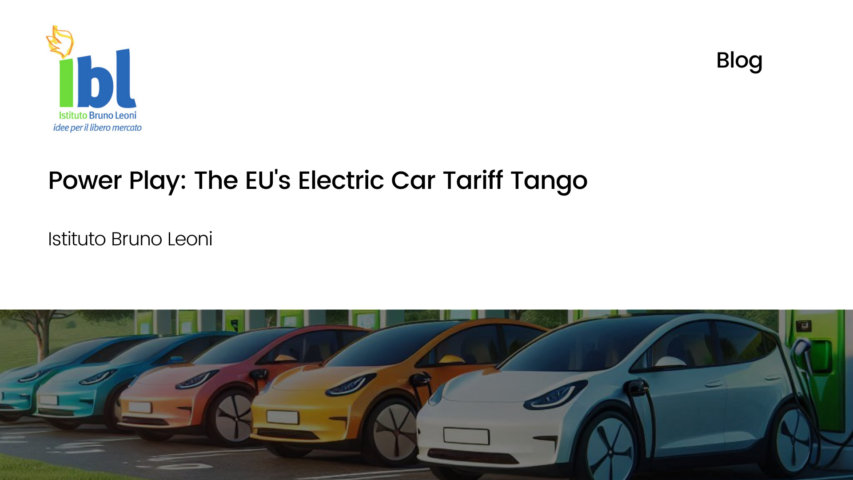Power Play: The EU’s Electric Car Tariff Tango

Power Play: The EU's Electric Car Tariff Tango
Carlo Stagnaro // June 21 2024
The increase in tariffs on electric cars imported from China could be the last act of the outgoing European Commission and describes well both its legacy and its contradictions.
A variable duty of between 17 per cent and 38 per cent will be added on top of the already existing 10 per cent tariff.
The decision stems from an investigation into subsidies granted by Beijing to its electric vehicle producers, which, according to Brussels, risk distorting the competition to the detriment of European carmakers. The aim of the duty the European Commission wants to apply is to offset these subsidies: thus, it will be company-specific, depending on the subsidies actually received by that company and whether it has exhibited a more or less cooperative attitude during the Commission’s investigation. Thus, some Chinese e-vehicles might be subject to a tariff as high as 48 per cent, in case they are manufactured by the most subsidised or least cooperative companies.
This may all seem quite straightforward, but it is not.
The subsidy inquiry is, of course, a formality and a pretext; but at least it shows an attempt to rationalise a measure that is purely protectionist and was announced as such right at the outset.
On the other hand, a few weeks ago, United States president Joe Biden did not even pretend to reach for an excuse when raised a 100 per cent tariff in the name of American strategic autonomy.
As for the European tariff, China did not wait long to respond, opening its own investigation into European pork subsidies: turns out, out of the 1.55 million tonnes of pork meat that Beijing is expected to import in 2024, about half comes from the European Union.
However, there are two aspects to the EU duty that deserve to be highlighted and that clearly represent the folly of our times.
The first concerns the expected outcomes of the tariff.
The duty, by inevitably leading to an increase in the cost of electric cars, is likely to end up shrinking the market rather than favouring European manufacturers. E-vehicles are already expensive products today, and many medium- to low-income households cannot afford them; further increases in their cost will reduce the propensity for any but the truly wealthy to purchase them.
Besides, European manufacturers are already struggling to serve existing demand, and there is little (if any) evidence that Chinese imports have displaced domestic models, as shown by recent research.
The second element relates to the stated targets.
The debate on the market for e-vehicles stems, to a large extent, from that political choice of making electric mobility a cornerstone of Europe’s energy transition. Thus, generous subsidies have been introduced for the purchase of electric vehicles. More importantly, after 2035, consumers will no longer be allowed to register new vehicles equipped with internal combustion engines. So, instead of exploring a plurality of tools and technologies, the EU has preferred to put all its proverbial eggs in one basket – which, incidentally, is a basket of products where Europe is relatively uncompetitive, viz., e-vehicles and their batteries.
This is so not because the Chinese provide subsidies, which may be a part of the story, but primarily because Beijing moved first and is technologically more advanced. Thus, the paradox is that EU member states will spend considerable amounts of resources to subsidise the purchase of e-vehicles, but these subsidies will by and large offset the consequences of the newly introduced trade duty. This will make their own climate targets more costly and harder to achieve.
The duty will be triggered on 4 July, unless a compromise is reached with Beijing. Let us hope this happens, for otherwise, the EU will have taken another step towards a more closed, less sustainable world.
The original article was published by IBL in Italian.
REFERENCES
Evenett, Simon J., and Fernando Martín (2023). Where do EU citizens source foreign EVs from? Putting fast-growing Chinese EV sales in the EU in perspective. Zeitgeist series briefing #13. 26 September 2023.
‘Le lezioni dei dazi sull’auto cinese e l’eredità della Commissione’, Istituto Bruno Leoni (IBL), 18 June 2024 (https://www.brunoleoni.it/dazi-auto-cina-europa)
EPICENTER publications and contributions from our member think tanks are designed to promote the discussion of economic issues and the role of markets in solving economic and social problems. As with all EPICENTER publications, the views expressed here are those of the author and not EPICENTER or its member think tanks (which have no corporate view).



